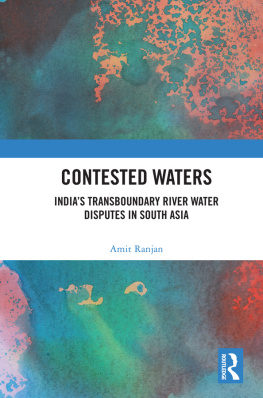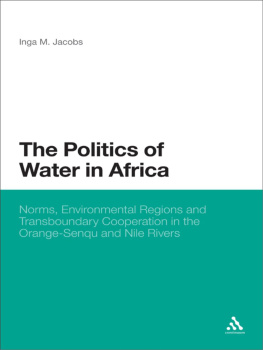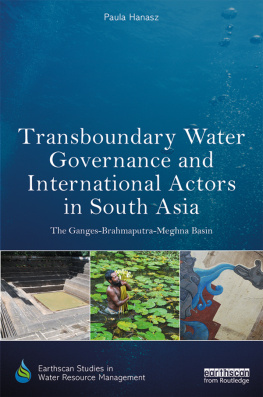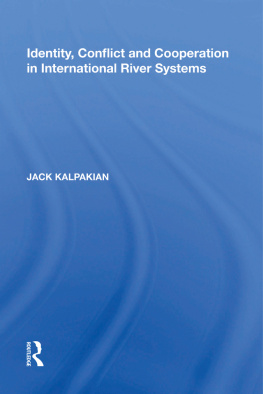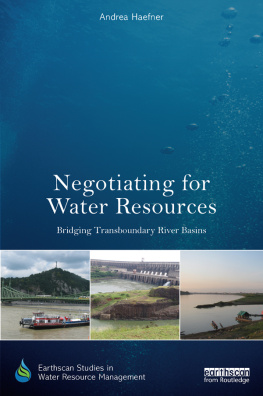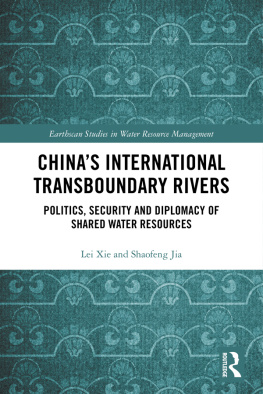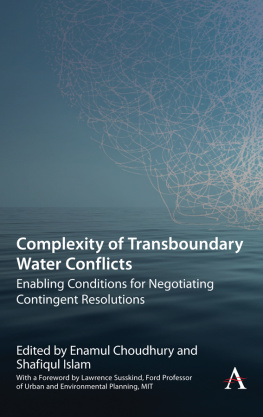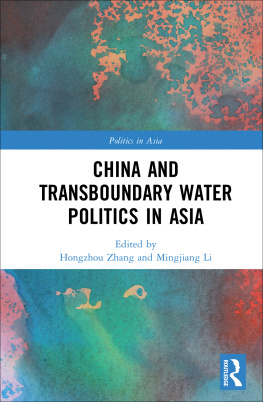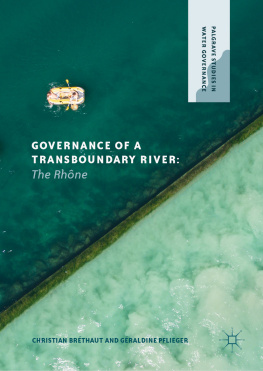Contested Waters
This book examines Indias transboundary river water disputes with its South Asian riparian neighbours Pakistan, Bangladesh, Nepal, and Bhutan. It explores the history of disputes and cooperation over the transboundary river water in this region as well as discusses current disputes and future concerns. It analyses how and why existing transboundary river water sharing treaties between India and its South Asian riparian neighbours are confronted with challenges. The book indicates that Indias transboundary river water disputes with its South Asian riparian neighbours are likely to escalate in coming years due to the widening of the demand-supply gap in the respective countries. It further shows the impact of bilateral relations on the resolution of transboundary river water disputes, even as cordial relationships do not always guarantee the absence of river water disputes between riparian states. The book looks at some key questions: How political are Indias transboundary river water disputes in South Asia? Why do the roots of Indias rivers water disputes with Bangladesh and Pakistan lie in the partition of British India in 1947? Why are there reservations against Indias hydroelectricity projects or allegations of water theft? Is it possible to resolve transboundary river water disputes among these South Asian countries?
This book will greatly interest scholars and researchers working in the areas of river management, environmental politics, transnationalism, water resources, politics and international relations, security studies, peace and conflict studies, geopolitics, development studies, governance and public administration, and South Asian studies in addition to policymakers and journalists.
Amit Ranjan is Research Fellow at the Institute of South Asian Studies, National University of Singapore, Singapore. He is the author of India Bangladesh Border Disputes: History and Post-LBA Dynamics (2018) and has edited three books Partition of India: Postcolonial Legacies (2019), India in South Asia: Challenges and Management (2019), and Water Issues in Himalayan South Asia: Internal Challenges, Disputes and Transboundary Tensions (2020). His papers, review essays, and book reviews have been widely published in journals, including Asian Affairs, Asian Survey, Economic & Political Weekly, India Quarterly, Indian Journal of Public Administration, Studies in Indian Politics, Social Change, South Asia Research, The Roundtable: The Commonwealth Journal of International Affairs, Journal of Asian Security and International Affairs. He has also contributed commentaries, opinion editorials and reviews in newspapers and websites such as The Citizen, The Friday Times, The Wire, and Prabhat Khabar.
Amit Ranjan offers an important perspective on water disputes in South Asia triggered by the Partition of the Subcontinent, deepened by the regions inability to depoliticise transboundary river water management and sharpened by the new factors like climate change, and contributes to a better understanding of a major source of regional conflict in South Asia.
C. Raja Mohan is Director at the Institute of South Asian Studies, National University of Singapore.
Contested Waters
Indias Transboundary River Water Disputes in South Asia
Amit Ranjan
First published 2021
by Routledge
2 Park Square, Milton Park, Abingdon, Oxon OX14 4RN
and by Routledge
52 Vanderbilt Avenue, New York, NY 10017
Routledge is an imprint of the Taylor & Francis Group, an informa business
2021 Amit Ranjan
The right of Amit Ranjan to be identified as author of this work has been asserted by him in accordance with sections 77 and 78 of the Copyright, Designs and Patents Act 1988.
All rights reserved. No part of this book may be reprinted or reproduced or utilised in any form or by any electronic, mechanical, or other means, now known or hereafter invented, including photocopying and recording, or in any information storage or retrieval system, without permission in writing from the publishers.
Disclaimer: The author has made every effort to ensure that the information presented in the book was correct at the time of press, but the author and the publisher do not assume and hereby disclaim any liability with respect to the accuracy, completeness, reliability, suitability, selection and inclusion of the contents of this book and any implied warranties or guarantees. The author and publisher make no representations or warranties of any kind to any person, product or entity for any loss, including, but not limited to special, incidental or consequential damage, or disruption alleged to have been caused, directly or indirectly, by omissions or any other related cause. Perceived copyright omissions if brought to notice will be rectified in future printing.
Trademark notice: Product or corporate names may be trademarks or registered trademarks, and are used only for identification and explanation without intent to infringe.
British Library Cataloguing-in-Publication Data
A catalogue record for this book is available from the British Library
Library of Congress Cataloging-in-Publication Data
A catalog record for this book has been requested
ISBN: 978-1-138-04033-5 (hbk)
ISBN: 978-1-003-04512-0 (ebk)
Typeset in Sabon
by Apex CoVantage, LLC
To Papa and Mai
| BC | Boundary Commission |
| BE | Budget Estimates |
| BJP | Bhartiya Janata Party |
| BNP | Bangladesh Nationalist Party |
| BNU/BTN/NU | Bhutanese Ngultrum or Ngultrum |
| CAA | Citizenship Amendment Act |
| CBTE | Cross Border Trade of Electricity |
| CD | Composite Dialogue |
| DGPC | Druk Green Power Corporation |
| GBM | Ganga Brahmputra Meghna |
| HEP | Hydroelectric Power |
| HLTC | High Level Technical Committee |
| ILR | Interlinking of Rivers |
| IRS | Indus Rivers System |
| IWT | Indus Waters Treaty |
| JCE | Joint Committee of Experts |
| JRC | Joint Rivers Commission |
| kWh | Kilowatt Hour |
| MAF | Million Acre Feet |
| MoU | Memorandum of Understanding |
| MW | Megawatt |
| NDA | National Democratic Alliance |
| NRC | National Register of Citizens |
| NWDA | National Water Development Agency |
| SAARC | South Asia Association for Regional Cooperation |
I am thankful to my MPhil supervisor Professor I.N. Mukherji, who introduced me to the world of contested waters. My PhD supervisor Professor Uma Singh deserves a special thanks for guiding and being supportive to me in various ways.
While working at the Indian Council of World Affairs (ICWA) (2013January 2017), New Delhi, I started working on this manuscript. Later, in 2017, I moved to the Institute of South Asian Studies (ISAS), National University of Singapore, Singapore (NUS). Here, I managed to satisfactorily finish and submit the draft for publication. I am thankful to all my colleagues at ICWA, particularly Dr Vijay Sakhuja, Dr Pankaj Jha, Dr Samatha, Dr Rahul Mishra, and Dr Shamshad Ahmad Khan.

